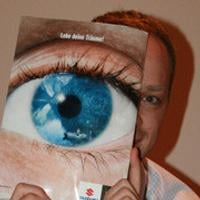[for Kumbo]
Yoshihide Otomo (turntables and guitar)
Sachiko Matsubara (sampler)
Yumiko Tanaka (futozao-shamisen)
Masahiro Uemura (drums)
Yasuhiro Yoshigaki (drums)
Naruyoshi Kikuchi (soprano sax)
Mitsuru Nasuno (electric bass)
Kazuhisa Uchihashi (electric guitar and effects)
Sampling guest: Kim Suk Chul (hojok)
Composed by Yoshihide Otomo
Arranged by Yoshihide Otomo and Ground Zero
Kim Suk Chul was recorded November 16, 1996 at Yong-Gang Hall, Seoul, Korea by Shigenori Noda.
Recorded January 5 and mixed January 14, 1997 at GOK SOUND, Tokyo by Yoshiaki Kondo
Mastered January 15, 1997 at Kojima Recording Inc., Tokyo by Yoshiaki Kondo
Special engineer: Yoshiaki Kondo
Produced by Concent Chan (Sachiko Matsubara and haruna ito)
Production advisor: Shigenori Noda
Art cordination and publicity by HEADZ
Design by aGrippa records
Includes liner notes (in Japanese) about Consume Ground Zero project
Released April 1997
link ku albumu:
http://www.zshare.net/download/ground-zero-consume-red-zip.html
booklety tu:
http://www.zshare.net/download/booklety-zip.html
Consume Ground Zero!
by Otomo Yoshihide
It's easy and maybe even cool to say "to hell with copyright." Butof course, things aren't really that simple. What exactly is thedifference between someone using your performance on their own CDwithout your permission and making a load of money, and GROUND ZEROsampling a revolution-era Pekinese opera to make a CD that DOESN'T makemoney? It burns me that a Japanese television network rotting in moneycan use my music without my knowing it, and I still don't get a centout of it. But as long as a TV network is paying JASRAC (the one andonly copyright organization in Japan) I'm told it's not illegal. So amI allowed to sample that TV channel without paying a cent, and make aCD from it? And then, what happens when that CD is sampled yet again byStock, Hausen and Walkman?
The two main reasons for the existence of copyright are this. When awork is created by someone, there is ownership in that work. And, ifsuch ownership exists, there is the question of how to justifiably turnthat into money. My problem is about the fact that not all forms ofcreativity can be accredited to a single entity. And if I'm correct,what about copyright?
In the general flow of things, which do not consist of mere solitaryproducts bobbing along but of things sampled and re-sampled, how cananybody say for sure who created what? The first question needs to bedirected to the idea that an artistic work is born from a singleentity's creativity. And so forth and so on. So rather than to go ontalking about it, the idea is to go ahead and do it.
So it comes to this. GROUND ZERO samples the musical performance ofa Korean national treasure, Kim Suk Chul. Any artistic purist shouldfly into a rage right there. His superhuman playing is without questiona product of his own creativity, but it could also be that he is infact a vessel for the voices of gods or ancestors. So GROUND ZERO takesand samples this brilliant music sacred enough to blow away any punyideas about copyright. Then we will have this remixed by a number ofunique sampling artists and place the two versions on a "choppingboard" of consumption and sampling. Call it public sampling if youwill. It's up to you how you cook with it. Mke it techno or enka oranything you like. What we want to see is not style or perfection butsomething beyond that (that is, if there is such a thing). The jumbleof criticisms and questions that may emerge should outbalance today'sdefinition of copyright together with its messy problems and questionsof creativity. Go ahead and butcher this with your own hands. We cantalk later.
Written in November 1996
zdroj: http://www.japanimprov.com/yotomo/groundzero/consume.html






